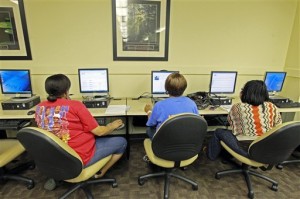Only 3 out of 10 Filipinos have access to Internet—report
MANILA, Philippines–The Internet remains inaccessible to seven out of 10 Filipinos, despite the country’s self-proclaimed status as the world’s center for social media, a new report by a United Nations (UN) agency showed.
The Broadband Commission for Digital Development in its latest report urged developing nations like the Philippines to take steps to encourage Internet usage, which has proven to be a significant contributor to economic growth.
A study done on the Philippines showed that broadband adoption contributes 0.32 percent of annual gross domestic product (GDP). “Given the importance of mobile in the economy of the Philippines, this would account for 6.9 percent of all GDP growth for the economy during the past decade,” the Broadband Commission said.
The findings on the Philippines, first reported by enterprise IT news site Newsbytes.ph, were published in the agency’s annual report made public on Sunday.
“Broadband is today a critical infrastructure in the growing global digital economy, and countries that fail to invest in broadband infrastructure risk being excluded from today’s online economy, as well as the next stage of the digital revolution and future Internet,” the report read.
“Always-on connectivity can improve our lives in a myriad of ways by providing better access to health and education, enabling financial inclusion, facilitating m-payments, and creating transparency in government, as just a few examples,” the report added.
According to the report, the Philippines maintained its position as a cellar dweller in nearly all criteria measuring Internet adoption. In terms of Internet penetration, only 29 percent of Filipinos had access to the web through various channels. This placed the country at the 100th spot in a list of 177 markets.
The country was behind neighbors like Brunei, Vietnam, Malaysia, and Singapore.
The Philippines only had an average of 1.9 fixed Internet connections per 100 people as of 2011, earning the rank of 101st out of 172 countries measured. The Philippines was behind neighbors like Vietnam, Singapore, and Malaysia, but ahead of Indonesia, and India.
The country ranked slightly better at 96th in terms of mobile Internet use. The study showed 3.4 people had mobile Internet subscriptions—through their mobile phones, tablets, or Internet dongles—out of 100 people at the end of last year.
Singapore had the most with 110 mobile broadband connections out of every 100 people, which indicates that a significant portion of the population had more than one device connected to the web.
About 15 percent of Philippine households had at least one Internet connection, placing the Philippines at 54th out of 127 countries.
The Philippines did lead in one field: social media penetration. The country ended 2011 with a score of about 75 percent in terms of the number of social media accounts relative to the number of Internet users. Trailing closely behind were Indonesia and Brazil. The Philippines’ score was well above the global average of around 60 percent.
The Broadband Commission was formed by the UN Educational, Scientific, and Cultural Organization and the International Telecommunications Commission (ITU) in 2010 in response to call to step-up efforts to meet Millennium Development Goals.
